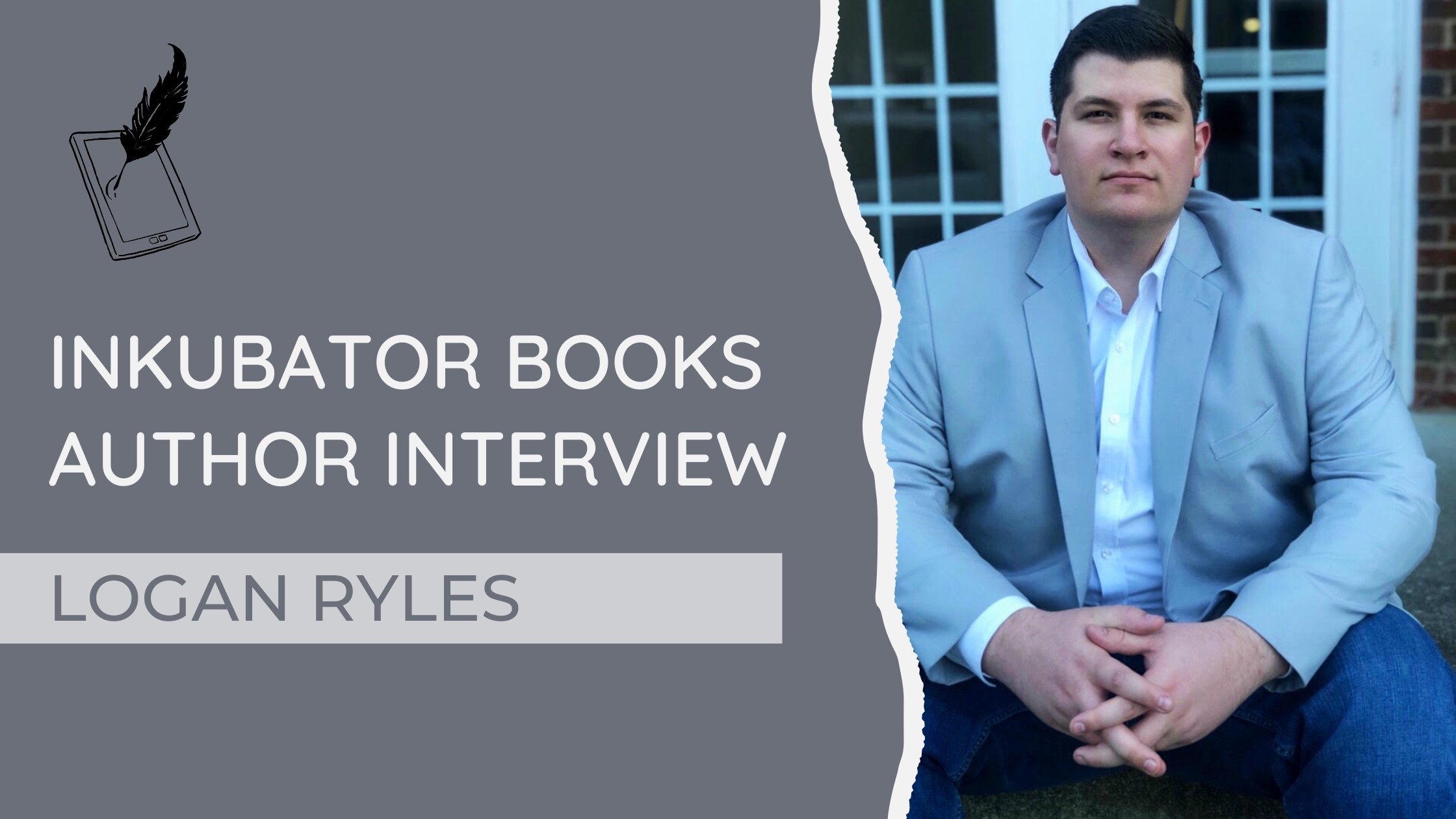Today, we’re speaking with Inkubator Books’ author Logan Ryles. Logan is the author of The Mason Sharpe action thriller series.
Inkubator Books: When did you start writing?
Logan Ryles: I finished my first novel a few days before my fifteenth birthday. From there I continued writing through high school before taking a break to pursue college. I got married and enjoyed a successful career in finance, but the dream of writing never left me. In 2018 I returned to the keyboard, and I’ve been happily writing ever since.
IB: What does a typical day of writing look like for you?
LR: I try to stay as consistent as possible. Routine is good for me. Typically, I work Monday through Friday and start the day around seven a.m. I enjoy some quiet personal time before hitting the keyboard. Depending on the day, I’m either focused on drafting a manuscript, or planning/editing a manuscript. On drafting days I shoot for six thousand words, broken into four fifteen-hundred-word sprints. In between sprints I enjoy coffee with my wife, hitting the gym, reading, etc. I find that my creative focus wanes in the afternoon, so I usually switch to administrative tasks before quitting work around six p.m. for dinner and relaxation time with my amazing wife, Annie. I certainly enjoy some flexibility, but still strive to maintain some structure.
IB: What’s the most difficult part of your writing process?
LR: Outlining, definitely. I’m a dedicated planner, crafting a multi-thousand-word outline for every book I write. Having that framework in place ensures that the story is well structured, and it also prevents writer’s block. I can always write, even if I’m having an off day, because I know what to write. However, outlining itself is tricky because you’re pulling ideas out of thin air. I start with a concept, then build story events around that concept. Generating plot points and twists (especially unique ones) is challenging, but it’s very rewarding when I get it right. There’s this gif of a football player spiking the football in the end zone that I always send my wife whenever I come up with a great twist. It’s a terrific feeling.
IB: What comes first for you – plot or characters?
LR: I like to plan my plot and then discover my characters as I write. So, I guess I would say plot comes first, but that’s only because I want to establish a solid plot beforehand, allowing me to focus 100% on characters during the actual drafting process. It’s my personal belief that great characters are what makes the difference between a decent book and a terrific book. They’re incredibly important. I like my characters to be as vibrant and real as possible.
IB: Which of your books is your favorite? Why?
LR: I’d have to say Flash Point. It’s not the most popular Mason Sharpe novel (that title goes to End Game), but something about it just really resonated with me. Flash Point was incredibly difficult to outline. The toughest Mason book by far. There were so many plot problems and snags with the story logic. During the drafting phase, I felt like the book was a flop. I actually told some of my friends: “I feel like I’m throwing a checkdown, and I really want the touchdown.” But then toward the end of that process and during the editing phase, the story came alive. I could picture the scenery at “Hank’s little corner of paradise” so clearly. The characters were so real. The tone was so defined—fun, but deadly serious. I got to see Mason from a new angle. It was just a really special story.
IB: How would you describe your ideal reader?
LR: I value any reader who’s willing to take a shot on a new author. I think the readers who resonate most with my stories are people who want that character-driven, rich human experience. Yes, I’m an action guy. Lots of gunshots and screaming tires. But I like to go deeper than that. The merit of the characters and their internal humanity is what gives gravity to the gunfights.
IB: What are you doing when you aren’t writing?
LR: Planning to write? I love what I do. It’s always on my mind. But I have focused recently on pushing back a little. I could easily be a workaholic. I love beach trips with my wife, play time with our Chiweenies, and long motorcycle rides astride my Honda VTX. We travel pretty often, and enjoy movies, reading, and music. Football in the fall, fishing in the spring. Doing it all with Annie is the best part.
IB: What does your writing space look like?
LR: I’m really blessed to enjoy a nice home office. I built it out a few years ago and have customized it to meet my evolving needs. I have a large desk with an ultrawide monitor where I write, edit, and outline. I have another desk where I read, study, and plan things out with pencil and paper. Disconnecting from technology is helpful sometimes. Also, there are lots of bookshelves for my growing personal library. I recently added a fish tank with a little blue Siamese betta fish I call Kip. He keeps me honest when I want to blow off work early.
IB: Have you ever traveled to research for a book?
LR: I travel for research as often as possible, usually four or five times a year. I’ve visited about 80% of the locations in my Mason Sharpe series, and I feel those experiences really add authenticity and dimension to the writing. We love to travel and hope to do more of it.
IB: What genres do you like to read? Who are some of your favorite authors?
LR: Obviously, I love thrillers. Lee Child is a huge hero of mine. Don Pendleton’s Mack Bolan is a character I have limited exposure to but am also inspired by. I started reading that series after my readers mentioned that Reed Montgomery reminded them of Mack Bolan. Other authors I enjoy include Harlan Coben, Vince Flynn, Clive Cussler, and John D. MacDonald. All giants of the genre.
IB: What was your favorite childhood book?
LR: I read a lot of fantasy as a kid. Brian Jacque’s Redwall series was a hall of fame favorite, along with John Flanagan’s Ranger’s Apprentice series and (of course) J.R.R. Tolkien’s The Hobbit. The Hardy Boys introduced me to mystery. The first adult thriller I ever read was Plaguemaker by Tim Downs. That book certainly had an impact in my decision to become a thriller writer. It was electric.
IB: Have you ever abandoned a book you were writing? How did you know it was the right thing to do?
LR: Plenty of times. They all rest in a dusty corner of my computer files. Some will never see the light of day. A couple… we’ll see. There are passion projects I don’t currently have time for, but someday I would really love to see them finish the race and make it into print. Whenever an idea feels too big for my current skillset or schedule, I know I have to put it on hold.
IB: Do you have any tips for first-time authors?
LR: Keep writing. That sounds trite, but let me explain. No matter whether you have one book or ten, whether you have a publishing deal or are seeking one. Even if you think you just completed your magnum opus. Keep writing. Start the next project. Challenge yourself. Write the next book. It’s always been my experience that nothing I write is either as good or as bad as I think it is. The only way to establish a career and grow progressively better in your craft is to always be working on the next story. So be tenacious. Believe in yourself and keep going, ignoring pessimistic outside voices as necessary. Sometimes it’s a lonely road… but it’s an amazing path to follow.
IB: Who inspires you?
LR: I’m very inspired by professional athletes, particularly American football players. To me, their job is a perfect example of art and professionalism intersecting at the pinnacle of performance. They do the work, day in and day out. They grind when nobody is looking. They focus on the details. They refine, they press on, they’re never satisfied with mediocrity. Then they hit the field on game day, and the art begins. Their creativity is born out of all that invisible discipline. The really good players make it look easy, but that’s only because of the thousands of hours behind the scenes already invested. That level of dedication and passion is really motivating for me. I’ve seen it reflected in some of the great people I’ve been blessed to know personally, and it’s definitely the kind of writer I want to be. Disciplined, dedicated, relentless.
IB: If you could eliminate one thing from your daily life, what would it be?
LR: That’s easy. Negativity. I would ax it in a heartbeat, and I do exactly that at every opportunity. It’s a constant battle in our modern society. With the twenty-four-hour news cycle and the power of social media, pessimism and cynicism are viral diseases. The only antidote I’ve found is personal faith and deliberate disconnection from the foolishness—which is also a discipline. Sometimes I still get sucked in, but I’d like to think I’m getting better at spreading positivity.
IB: Do you have any pets?
LR: Indeed! Two dogs and three cats. We love animals. I think if we had some land, we would probably have many more. In a past life I sheared alpacas for a spring, and I’ve always wanted to keep a few. Maybe someday.
IB: How do you approach your genre in a unique way?
LR: This is a great question. For me, it all boils down to characters. The more authentic and gripping I can make the human element of my stories, the harder they hit. Thrillers are all about the rush—adrenaline, suspense, raw energy. But none of those emotions can be present without stakes, and in order to have meaningful stakes you have to have strong characters readers care about. For me, the name of the game is writing the best characters inside the strongest plot I can.
IB: How do you relax?
|LR: This is a tough one for me. I’m a naturally intense person, and eight hours of mental car chases and gun battles certainly aren’t conducive to a great night’s sleep. Riding motorcycles is one of my favorite forms of unwinding. I love fishing, or really any activity near the water. We also maintain a small garden—digging in the dirt is a great way to clear my head.
IB: What’s one thing you wish your readers knew about you?
LR: How much I appreciate them. It’s been my dream to be a career novelist since childhood, and I always knew it would be a long shot. Being able to wake up every day and craft stories for a living is such a monumental blessing. I owe every reader who has ever picked up one of my books for this opportunity. I really can’t thank them enough. The best I can do is keep writing and keep growing as a storyteller. It’s always my objective to make my next book better than my last. I hope to keep bringing my readers these adventures for decades to come.
Thanks to Logan Ryles for sitting down with us today.
Want to read Logan’s books? Check out his titles here on Amazon.
You can find him at the following places:
Website: www.loganryles.com
Facebook: www.facebook.com/loganrylesauthor
Instagram: www.instagram.com/logan.ryles

